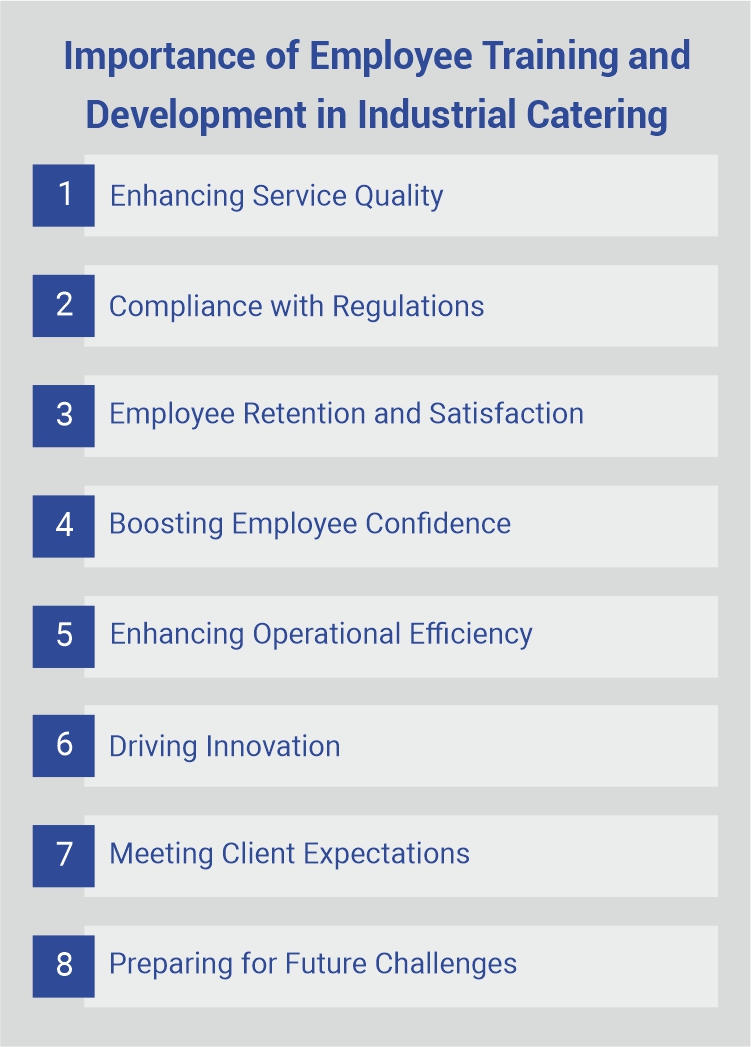Introduction:
In the highly competitive and dynamic landscape of industrial catering, employee training and development play a crucial role in ensuring the delivery of top-notch food services. In India, where the food catering industry is rapidly expanding, companies must invest in their workforce to maintain high standards and meet the ever-evolving demands of clients. This blog will explore the essential skills and competencies required for employees in the industrial catering sector, and emphasize the importance of continuous training and development to enhance service quality and operational efficiency.
Skills and Competencies Required in Industrial Catering
1. Culinary Expertise:
At the heart of any catering service is the ability to prepare and serve quality food. Employees must possess strong culinary skills, including knowledge of various cuisines, cooking techniques, and food presentation. This expertise ensures that food is not only delicious but also appealing and safe to consume.
2. Food Safety and Hygiene:
Food safety is paramount in industrial catering. Employees must be well-versed in food safety regulations and hygiene practices to prevent foodborne illnesses. Training in areas such as proper food storage, temperature control, and sanitation is essential to maintaining high standards of food safety.
3. Customer Service Skills:
In the food services industry, customer satisfaction is key. Food serving team must have excellent customer service skills to interact effectively with clients and guests. This includes being attentive, courteous, and responsive to customer needs and feedback.
4. Time Management and Efficiency:
Industrial catering often involves serving large numbers of people within tight timeframes. Employees must be adept at time management and able to work efficiently under pressure. This competency ensures that food is prepared and served promptly without compromising quality.
5. Teamwork and Collaboration:
Catering services require a high degree of collaboration among kitchen staff, servers, and management. Strong teamwork skills are necessary for seamless coordination and effective communication, which are critical for delivering exceptional service.
6. Adaptability and Flexibility:
The catering industry is subject to changing client demands and unforeseen challenges. Employees must be adaptable and flexible, ready to adjust to new situations and implement changes as needed to meet client expectations.
7. Technical Skills:
With the increasing use of technology in catering operations, employees need to be familiar with kitchen equipment, inventory management systems, and point-of-sale (POS) systems. Training in these technical skills helps streamline operations and improve efficiency.
8. Leadership and Supervisory Skills:
For those in supervisory or managerial roles, leadership skills are essential. This includes the ability to motivate and manage a team, resolve conflicts, and make strategic decisions to improve service delivery and operational outcomes.
Importance of Continuous Training and Development

1. Enhancing Service Quality:
Continuous training and development ensure that employees stay updated with the latest industry trends, best practices, and technological advancements. This knowledge translates into improved service quality, as employees are better equipped to meet client expectations and deliver superior food services.
2. Compliance with Regulations:
The food catering industry is subject to stringent health and safety regulations. Ongoing training helps employees stay compliant with these regulations, reducing the risk of legal issues and ensuring the safety of clients and guests.
3. Employee Retention and Satisfaction:
Investing in employee training and development demonstrates a company's commitment to its workforce. This investment leads to higher job satisfaction, as employees feel valued and supported in their professional growth. As a result, companies can retain talented staff and reduce turnover rates.
4. Boosting Employee Confidence:
Continuous learning opportunities help employees build confidence in their skills and abilities. This confidence enables them to perform their roles more effectively and take on new challenges with greater assurance.
5. Enhancing Operational Efficiency:
Well-trained employees are more efficient and productive. They can perform their tasks with greater accuracy and speed, reducing waste, minimizing errors, and enhancing overall operational efficiency. This efficiency is crucial for catering services, where time and resource management are critical.
6. Driving Innovation:
Training programs that encourage creativity and innovation can lead to the development of new ideas and approaches. Employees who are empowered to think innovatively can contribute to the continuous improvement of catering services, helping the company stay competitive in the market.
7. Meeting Client Expectations:
Clients in the industrial catering sector have high expectations for quality and service. Continuous training ensures that employees are equipped with the skills and knowledge needed to meet these expectations consistently, resulting in higher client satisfaction and loyalty.
8. Preparing for Future Challenges:
The food catering industry is constantly evolving, with new challenges emerging regularly. Continuous training prepares employees to adapt to these changes, whether they involve new dietary trends, technological advancements, or regulatory updates. This preparedness positions the company for long-term success.
Conclusion
Employee training and development are integral to the success of industrial catering services in India. By equipping employees with the necessary skills and competencies, companies can ensure the delivery of high-quality food services and meet the diverse needs of their clients. Continuous training not only enhances service quality and operational efficiency but also boosts employee satisfaction and retention. As the food services industry in India continues to grow, investing in employee development will remain a key factor in achieving excellence and maintaining a competitive edge.
Industries we serve:
Automobile | Manufacturing | Pharmaceutical | Oil and Gas | Healthcare | Ancillary | FMCG | Education | Real Estate | Commercial | Mining | Hotels

